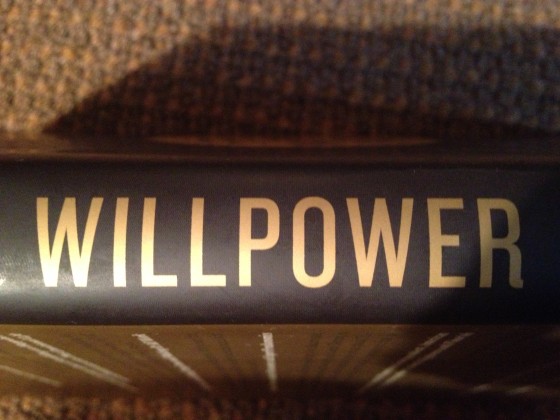
Not long after I published Six Simple Rules for a Better Life, I read a book called Willpower, by Roy Baumeister & John Tierney, which had come out the same month.
In my book’s introduction, I talk about the importance of breaking down your big goals into small pieces, and focusing on those pieces one at a time for the 21 days it takes to form a habit. I knew the method worked, but I didn’t know why it was so important until I read Willpower.
It was intriguing to me, after spending so much time writing a book about rules for a better life, to read on the second page of Baumeister and Tierney’s book that improving willpower is, in their view, the best route to a better life.
Baumeister and Tierney’s book is very scholarly, filled with references to numerous studies about willpower, but it’s an easy read.
My big takeaway from the book is our limited stock of willpower. As such, the key to making changes that stick is to go slow; to form habits because once something is a habit—once it’s routine and automatic; once you no longer have to think about it—you no longer need to expend your willpower. From there you can take on an additional habit, and so on.
I frequently write that New Year’s resolutions fail because they are too big or people take on too many changes at the same time. In Willpower, the authors explain even if we are trying to make unrelated changes (for example, eating well and being nicer to a spouse), the same, limited stock of willpower is tapped.
Benjamin Franklin, in Poor Richard’s Almanack, wrote, “‘Tis easy to frame a good bold resolution; But hard is the task that concerns execution.” That’s why, every time I give a speech, I start by saying I want the audience to walk away not only with a list of things they want to change, but also a game plan for implementing them. New Year’s resolutions won’t work unless they are taken on over time (as opposed to taking them all on starting January 1.)
Franklin learned to focus on one new habit at a time. “While my care was employ’d in guarding against one fault, I was often surprised by another. Habit took the advantage of inattention; inclination was sometimes too strong for reason.” What was he saying?
- Focus on one thing at a time as it’s hard to focus on more than one.
- When you don’t focus on behavior change, habits rule—habits (inclinations) overtake reason.
Some other takeaways from Willpower, including some of my interpretations of its message and how it interacts with mine:
- We need to eat to have energy for willpower (and not just eat, but eat well.)
- Getting sleep is also key. (If you are sleep deprived you are likely to have trouble sticking with the good habits you are working to make.)
- An additional reason why focusing on one new habit for 21 days is good is because daily falloff will happen and can be adjusted for when you give yourself more time.
- If you make lots of decisions, it fatigues your willpower. To deal with that, make the choices easier. For example, if you are watching what you eat, plan meals for the week in advance and make lists of shopping items so you don’t have to decide when you get to the store.
- Track your progress. The self-awareness from monitoring yourself that way helps you stay on track.
- Hitting smaller goals helps warm you up for achieving larger ones; self-control exercises, for example, working with your non-dominant hand. (My conclusion from this is to keep making small changes in order to keep exercising self-control. Keep learning, changing, and growing. Take on a new habit every 21 days.)
- Losing weight is the #1 New Year’s resolution, year after year. Diets rarely result in permanent weight loss. It is “better to make gradual changes that will produce lasting effects.” Set realistic goals. Drastic weight loss won’t stick if the regimen is too strict to follow permanently. It’s better to make smaller changes that can be sustained over time. Take your time reaching your goal, and then stick with your new lifestyle.
What are your experiences with willpower and self-control? Join the conversation with your comments…
Best regards,
David
